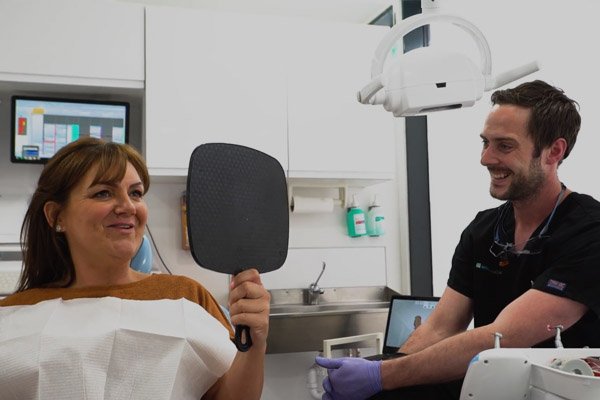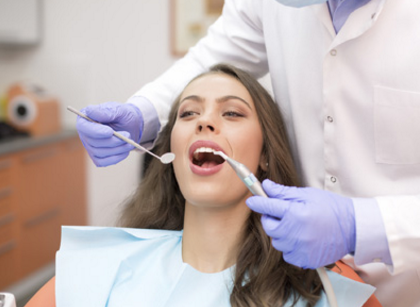Posts Tagged ‘Gum Disease’
What Else Could Your Bad Breath Mean?
Wednesday, June 17th, 2015
 Halitosis, commonly known as bad breath, can be an embarrassing problem. But did you know that bad breath can also be a sign of other health problems?
Halitosis, commonly known as bad breath, can be an embarrassing problem. But did you know that bad breath can also be a sign of other health problems?
What Causes Bad Breath?
Bad breath has a number of causes, the most common being poor oral and dental hygiene. If you have a poor dental routine then bacteria will build up in your mouth which can result in plaque, tooth decay and gum disease. Brushing your teeth, flossing and cleaning your tongue will help you to remove these bacteria.
Bad breath may also be caused by your habits. Smoking and consuming strongly flavoured foods and drinks such as garlic, alcohol and coffee may cause bad breath. This type of bad breath is generally temporary and can be remedied with good dental care and regularly visiting your dentist.
You may also experience bad breath as a result of crash dieting. Dramatically altering the foods you consume, either by through a low-carbohydrate diet or fasting causes your body to break down fat, producing chemicals called ketones which smell.
What are the Health Problems Associated with Bad Breath?
Bad breath is an embarrassing problem to have but did you know that it could also be a sign of other health issues? Halitosis has been found to be a sign of a number of health problems including: stomach cancer, lung cancer, kidney failure, diabetes and gum disease. Your mouth is a gateway to the rest of your body and any problems you are experiencing there may be an indication of a more serious problem. If you have noticed any change in your oral health you should make an appointment to visit your dentist who will be able to advise you.
What Can You Do To Prevent Bad Breath?
You can prevent or reduce your bad breath by following a number of steps:
- Visit your dentist regularly. Not only will they be able to determine the cause of your bad breath but they will also be able to provide tips and techniques to help.
- Practice good dental hygiene including brushing your teeth twice a day and flossing. This will help you to remove bacteria in your mouth.
- Stop smoking.
- Drink water and chew on (sugarless) gum.
- Eat snacks with a high water content such as cucumber, celery and carrots.
- Drink water. Dry mouth (xerostomia) has an effect on the flow of saliva into your mouth which can cause a build-up of bacteria, leading to bad breath. By drinking water you can help to keep your mouth moist and prevent bad breath.
Dental Care at Brite Dental?
If you are concerned about your dental health the contact the Brite Dental team. Our clinical care team is here to look after you and your dental health needs. We have practices in four locations and offer both NHS and cosmetic dentistry treatments.
Your Dental Health During Pregnancy
Thursday, June 11th, 2015
 Pregnancy can lead to dental problems in women, including an increased risk of tooth decay and an increased chance of developing gingivitis (gum disease). These problems can in turn affect your delivery, with studies showing that as many as 18 out of every 100 premature births may be triggered by gum disease.
Pregnancy can lead to dental problems in women, including an increased risk of tooth decay and an increased chance of developing gingivitis (gum disease). These problems can in turn affect your delivery, with studies showing that as many as 18 out of every 100 premature births may be triggered by gum disease.
It is always important to take proper care of your teeth and gums. However, if you are pregnant it is even more essential that you do all you can to avoid gum disease and other dental problems. Your baby’s teeth and mouth start to develop in the first weeks of pregnancy so by taking good care of your own oral health you will, in turn, help support the correct development of your baby’s dental health.
You (and Your Baby) Are What You Eat
Cravings
You may find that your experience unusual food cravings (or avoidance) during your pregnancy. It may also be the case that you have increased cravings for sugary foods. Snacking on sugary foods too often is bad for your teeth and can lead to an increased chance of tooth decay. You should try to snack on low-sugar alternatives where possible. However if you are finding it difficult to avoid your cravings then you should always rinse your mouth out with milk or water after consuming sugary food and drinks to stop plaque building up on your teeth.
Calcium & Vitamin D
During your pregnancy you will need an increased amount of certain vitamins. Calcium in particular is important not only to help your developing baby but also to protect your own bone mass. Vitamin D is important as well as it help the body utilise calcium. You can find calcium in yoghurt, milk and cheese and Vitamin D in eggs, fatty fish including salmon and margarine. During your pregnancy you should look to increase the amounts of these foods you are consuming.
Gum Disease During Pregnancy
During your pregnancy your body will have increased hormone levels which can make your gums more vulnerable to plaque. In fact, 40% of women will develop gum disease as some point in their pregnancy.
Research has also indicated a connection between gum disease and premature births and low birth weight. If your baby is born prematurely they could have problems with their hearing and eyesight and are at risk of health conditions such as cerebral palsy. If you experience soreness, swelling, pregnancy tumours (growths between your teeth) or bleeding gums you may be showing the first signs of gum disease It is imperative that if you experience any of these symptoms that you visit your dentist.
Morning Sickness and Your Teeth
It is often the case that hormones produced during pregnancy will soften the ring of muscle that keeps your food inside your stomach. As a result, you may experience morning sickness or gastric reflux during your pregnancy which will lead to your teeth becoming coated with stomach acids. If this happens repeatedly during your pregnancy you can damage your tooth enamel which can lead to an increased chance of tooth decay. If tooth decay is left untreated you may require root canal treatment.
To ensure your teeth are not affected by morning sickness you should rinse your mouth out thoroughly with tap water and follow up with a fluoridated mouthwash. Whilst it will be tempting to brush your teeth straight away you should try and wait at least an hour as your stomach acids weaken your teeth and brushing straight away can damage your teeth.
It may also be the case that brushing your teeth is affecting your gag reflex. If you are experiencing this problem then you can try using a toothbrush with a smaller head, try distractions whilst brushing including listening to music, or simply slowing down your brushing action.
Brite Dental and Your Pregnancy
Pregnancy can be a difficult time for your health in a variety of ways. If you are trying to become pregnant then you should consider your current dental hygiene routine. You are less likely to develop dental problems during your pregnancy if you already maintain a good oral hygiene routine. Correct dental treatment during pregnancy was found in one study to reduce the risk of premature birth by over 80 percent.
Dental care is provided for free by the NHS during your pregnancy and for one year after your due date. You simply need to fill out a FW8 form to apply for a maternity exemption certificate (MatEx). To find out more you can contact Brite Dental NHS Dentist and Cosmetic Dentistry in Scotland.
Why is Oral Hygiene Important?
Friday, November 28th, 2014
Proper oral hygiene is essential for living a healthy and happy life. If you neglect your teeth and oral hygiene, it’s likely that you’ll experience levels of pain, discomfort that will have a significant impact on your daily life and mental well-being.
In addition, having missing, damaged or cracked teeth can negatively impact our self-confidence and mental well-being, highlighting that oral hygiene is extremely important if we want to create a happy, care-free lifestyle.
This article looks further into the question of why oral hygiene is important, giving helpful advice, tips and tricks on how to improve your oral hygiene and look after your teeth so they remain in great condition for many years to come.
How to improve your oral hygiene?
If you would like to have beautiful and healthy teeth throughout your life, we would recommend visiting your dentist every 6 months for a check-up and having your teeth scaled and polished by a professional dental hygienist.
Another thing that will help keep your smile healthy is reducing your consumption of sugary, salty and acidy foods and drinks. Improving your diet and keeping sugary treats to a minimum (I.e. only once after dinner time) can vastly improve your oral health.
As a dental clinic, we want you to have the best possible oral health, so here are some more helpful tips to help you improve your oral hygiene:
- Brush twice a day: Brushing your teeth twice a day is crucial for removing food particles and plaque that can lead to tooth decay and gum disease. Use a soft-bristled toothbrush and fluoride toothpaste to thoroughly clean all surfaces of your teeth.
- Floss daily: Flossing helps remove plaque and food particles from between your teeth, where your toothbrush can’t reach. It’s best to floss before you brush your teeth to help dislodge any debris that might have been caught between your teeth.
- Use mouthwash: Mouthwash can help kill bacteria and freshen your breath. Look for one that is alcohol-free and contains fluoride.
- Schedule regular dental check-ups: Regular dental check-ups and cleanings can help catch any potential issues early, before they become more serious.
- Consider adult orthodontic treatment: If you have crooked or crowded teeth, orthodontic treatment can help straighten your smile and improve your overall oral health.
Remember, good oral hygiene habits are essential for maintaining a healthy smile. If you have any questions or concerns, don’t hesitate to contact our dental clinic for further advice and guidance.
The importance of having strong, healthy teeth
We’re told from a young age that we need to brush our teeth regularly and look after our teeth properly, but why are teeth so important?
You may think you know the answer; Without healthy teeth, we cannot chew and eat the foods that we love. However, whilst this is certainly one reason why teeth are important, it isn’t the only answer!
Teeth also play a vital role in many other areas, including speech, facial structure and our physical appearance. In addition, without a healthy, attractive smile our self-confidence may suffer and our mental well-being can take a hit.
There are several reasons why teeth are important, including:
- Chewing: Teeth play a crucial role in chewing and breaking down food into smaller pieces, which makes it easier for our bodies to digest.
- Speech: Without a full set of teeth, it can be difficult to form words and sounds properly.
- Appearance: Teeth are a prominent facial feature and can significantly impact our overall appearance and self-confidence.
- Supporting facial structure: Teeth help support our facial structure and prevent our cheeks and lips from collapsing.
- Protecting gums and jawbone: Teeth provide protection for our gums and jawbone by evenly distributing the force of our bite and preventing damage from occuring.
- Maintaining overall health: Good oral health is linked to overall health, so by keeping our teeth healthy and clean, we can actually help prevent serious health conditions like heart disease, diabetes, and stroke.
- Digestive health: Teeth play a critical role in the digestive process, as they help break down food so that it can be absorbed and used by our bodies.
- Preventing tooth decay and gum disease: Regular brushing and flossing can help prevent tooth decay and gum disease, which can cause pain, discomfort, and potentially lead to tooth loss.
As we can see, keeping on top of our oral health and ensuring our teeth are clean, healthy and happy will have a positive impact on our overall well-being.
Not only will healthy teeth help us maintain a good level of physical health but they will also improve our appearance and with it, ensure a good level of self-confidence and mental well-being.
Top tips for Looking after your teeth correctly
It is vital to get into a regular habit of cleaning your teeth if you wish to maintain a good level of oral hygiene. We recommend brushing your teeth at least twice a day for 2 minutes at a time.
Whilst you don’t need to buy expensive toothpaste to make your teeth healthy, you do need to make sure that your toothpaste has fluoride in it. Regularly change your toothbrush every 3 to 4 months. If you use an electric toothbrush. change the heads at the same rate. Make sure to brush either before or an hour after eating or drinking acidy drinks such as juice or wine in order to prevent teeth erosion.
We also strongly recommend flossing regularly, as brushing on its own will not fully clean the teeth and gums. Without flossing, plaque buildup or stray food particles will be left between teeth.
Some additional tips for looking after your teeth include:
- Eat a healthy diet
- Don’t smoke or use tobacco
- Consider getting dental sealants
- Be mindful of teeth grinding
- Visit your dentist regularly
The last point is one we cannot stress enough. Even with a great level of oral hygiene, serious issues can still be missed if you neglect visiting a professional dental clinic.
Having a dental check-up every 6 months will allow your dentist to spot any emerging issues and deal with them before they turn into a serious problem. If you find that cosmetic dentistry treatments are needed, remember we offer a fantastic dental finance plan that helps make necessary treatments more affordable.
Why not get ahead of the game and book your next dental checkup today via the Brite Dental website?
That way, you can relax knowing that your teeth will be checked, monitored and evaluated by a professional, giving you peace of mind that any pesky issues will be dealt with quickly, efficiently and effectively.
Book or join the practice the Brite Dental practice that suits you best and take a step towards a happier, healthier smile.




